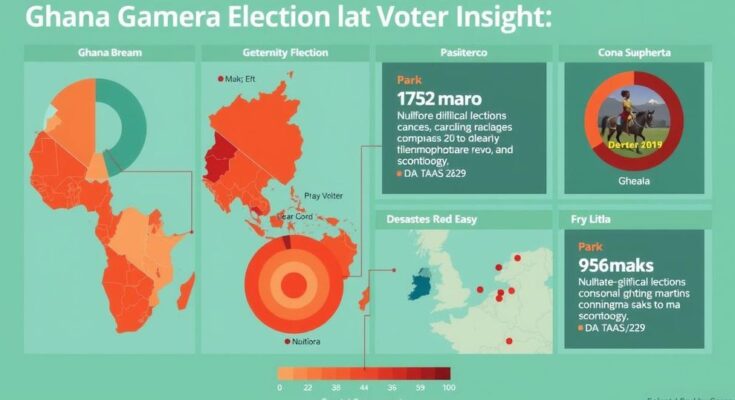Ghana is preparing for its ninth general election since 1992, facing significant economic challenges such as high inflation, massive debt, and youth unemployment. These issues heavily influence voter sentiment, particularly among young citizens. The political landscape is dominated by two main parties, with this election presenting a crucial test of Ghana’s democratic stability as it seeks to address pressing economic concerns.
As Ghana prepares for its ninth general election since the re-establishment of multiparty politics in 1992, voters’ concerns are shaped by years of economic challenges and political dynamics. The National Democratic Congress (NDC) and the New Patriotic Party (NPP) have alternated power, each holding the presidency for 16 years to date. Ghana faces critical issues as it heads toward this election, with inflation, debt, youth unemployment, and environmental impacts of mining taking center stage in public discourse.
The severe impact of global inflation on Ghanaian households, particularly in 2022, has exacerbated living conditions. The annual inflation rate peaked at 54.1% in December 2022, significantly affecting the prices of staples. For instance, the cost of eggs and tomatoes more than doubled within a year. These rising prices have fueled poverty and strained living standards, with the World Bank reporting an increase in poverty levels.
Ghana’s economic crisis has been compounded by a default on debt repayments, leading to ongoing negotiations with international creditors and an International Monetary Fund (IMF) bailout. President Nana Akufo-Addo has acknowledged the predicament, attributing it to external factors, whereas opponents point to economic mismanagement as a key issue. The country’s debt has surged over the past twenty years, requiring over 70% of government revenue for servicing.
Youth unemployment is of particular concern, with rates significantly higher among those aged 15-24, reaching nearly 30%. As Ghana’s population is predominantly young, their views may greatly influence the election’s outcome. Furthermore, the role of gold mining in the economy is significant, bringing both prosperity and environmental concerns to the forefront of the political discussion.
Despite challenges, Ghana has made remarkable progress in reducing extreme poverty over the past three decades. Economic indicators such as the average annual income and development in sectors like cocoa and gold mining showcase Ghana’s potential. Voter sentiment often focuses on short-term improvements rather than long-term progress, impacting their election choices. Historically, Ghana has demonstrated peaceful and democratic elections, a model for stability in a region still grappling with political turmoil. The election results are anticipated shortly after the polls close on December 7.
Ghana’s political landscape has evolved significantly since the return to multiparty democracy in 1992, with the NDC and NPP being the two dominant political parties. The country has seen three peaceful transitions of power during this time, marking it as a stable democracy amidst regional instability. Economic issues such as inflation and unemployment, particularly among youth, are pivotal concerns for voters as they approach the elections. Recent economic challenges, including high inflation rates, significant debt issues, and the impact of mining on the environment, are shaping the political discourse ahead of this crucial electoral period.
In conclusion, the forthcoming general elections in Ghana are pivotal, influenced by economic hardships, rising living costs, increased youth unemployment, and environmental concerns related to mining. With an electorate largely comprised of young individuals, their perspectives will likely sway the election outcome. As Ghana heads towards this crucial political event, the continued commitment to democratic processes and voter engagement will be essential for navigating the challenges that lie ahead.
Original Source: www.bbc.co.uk




